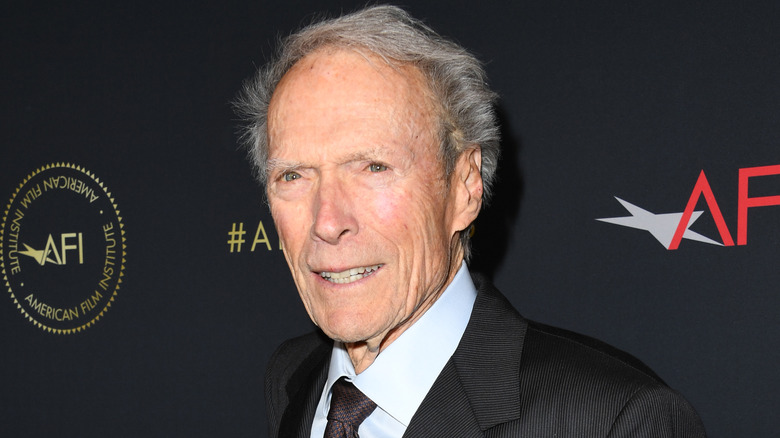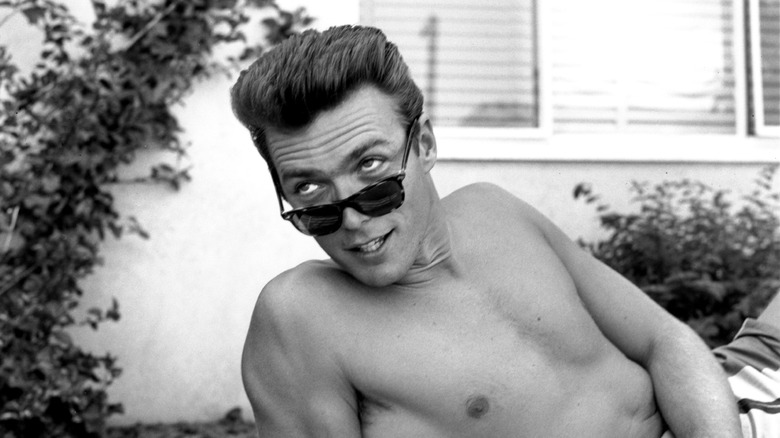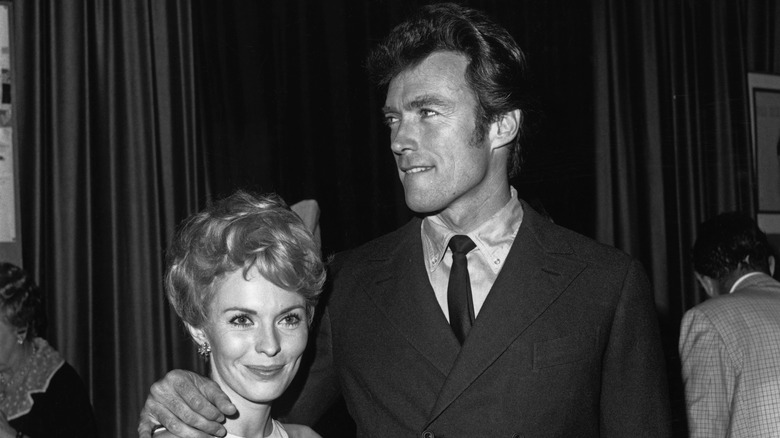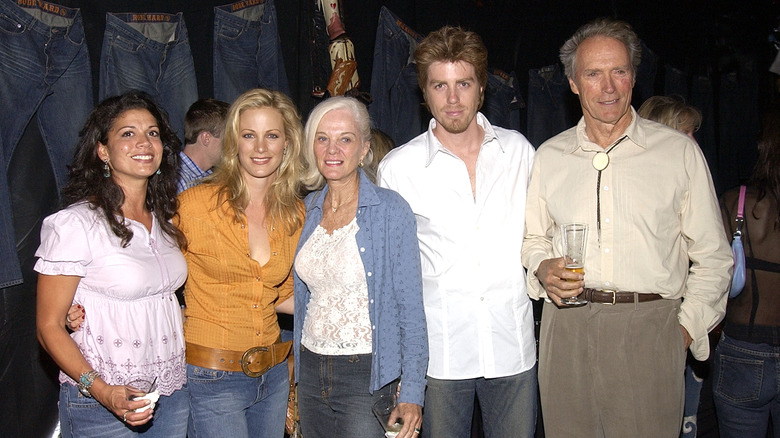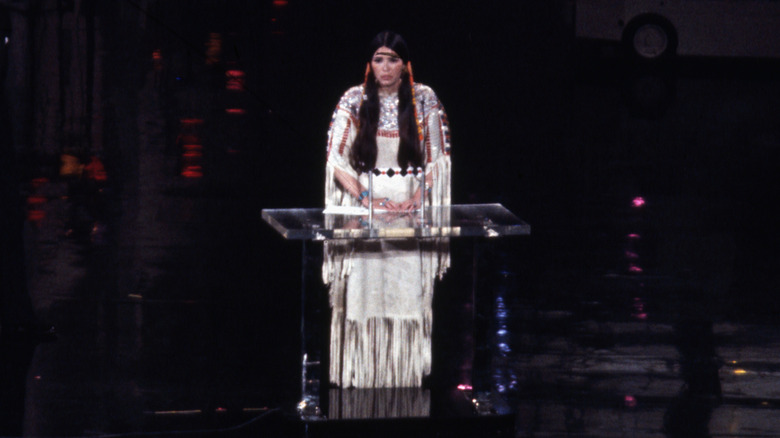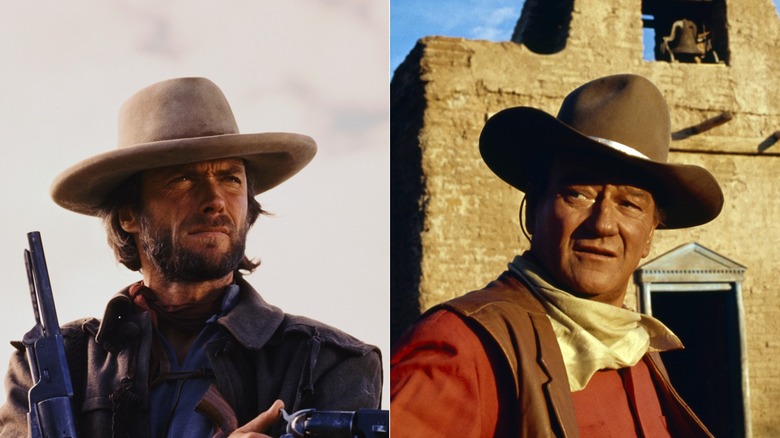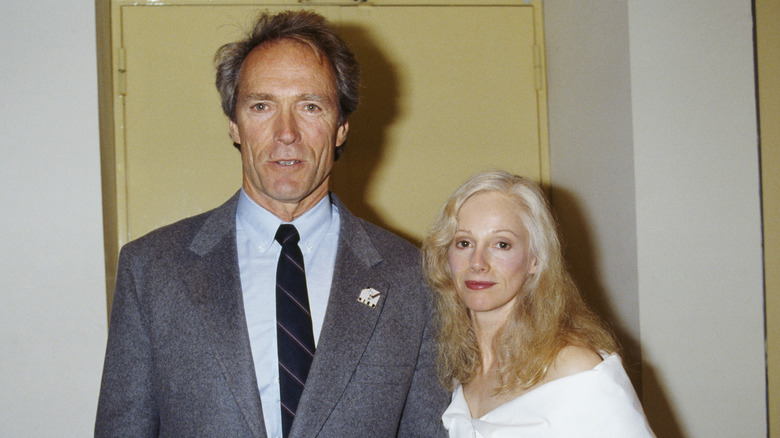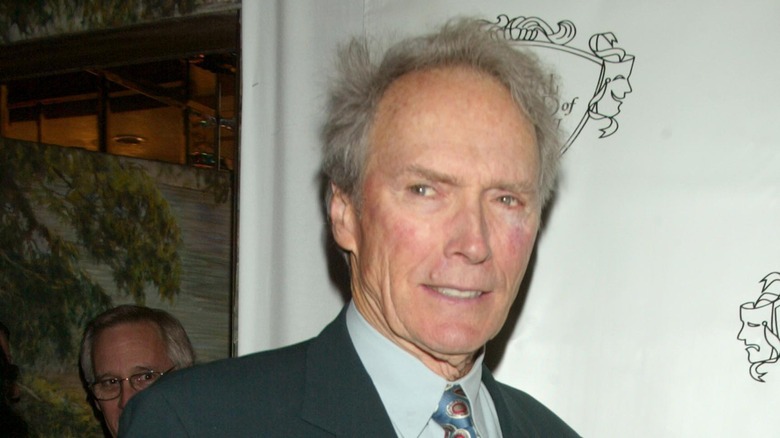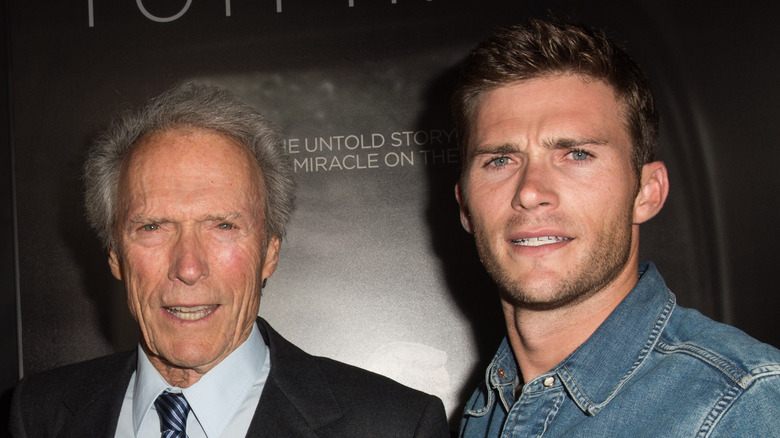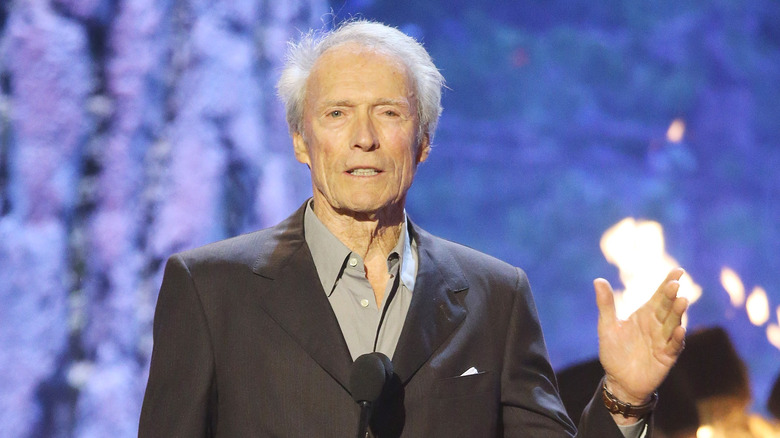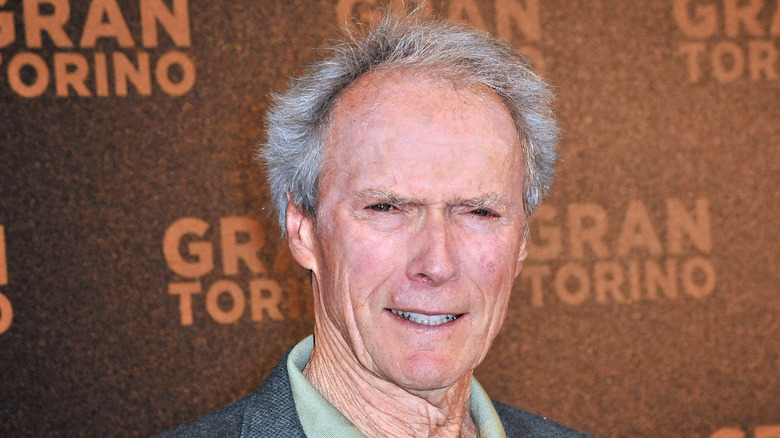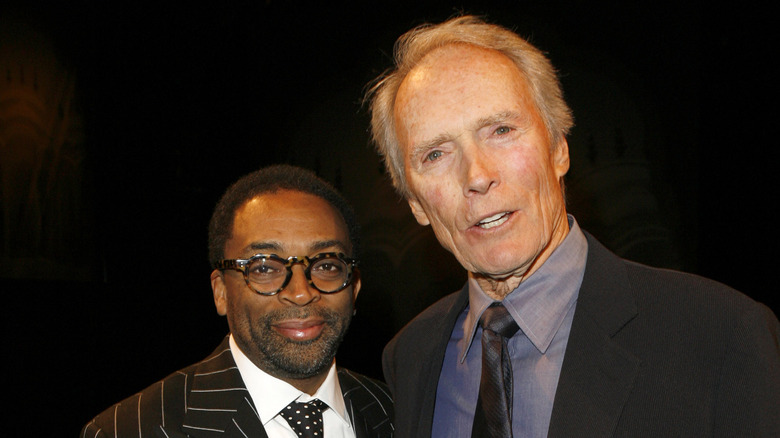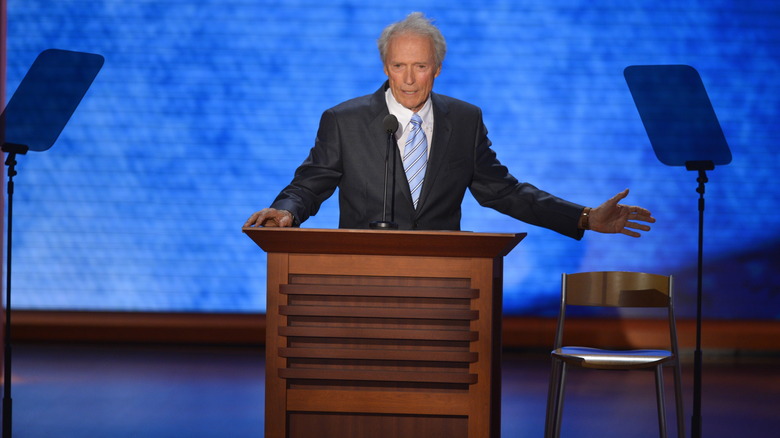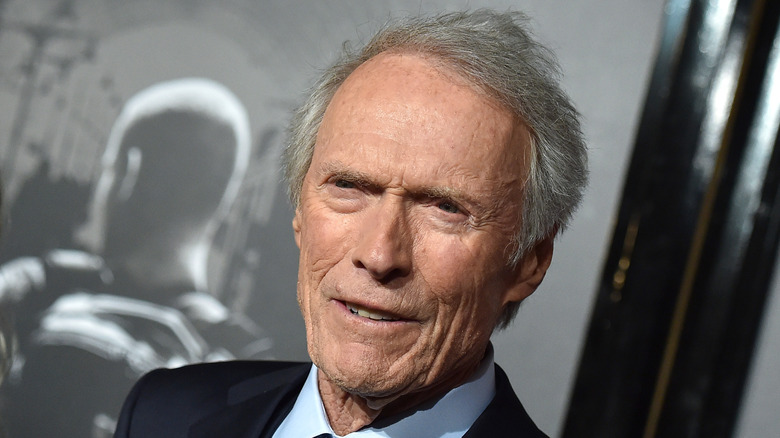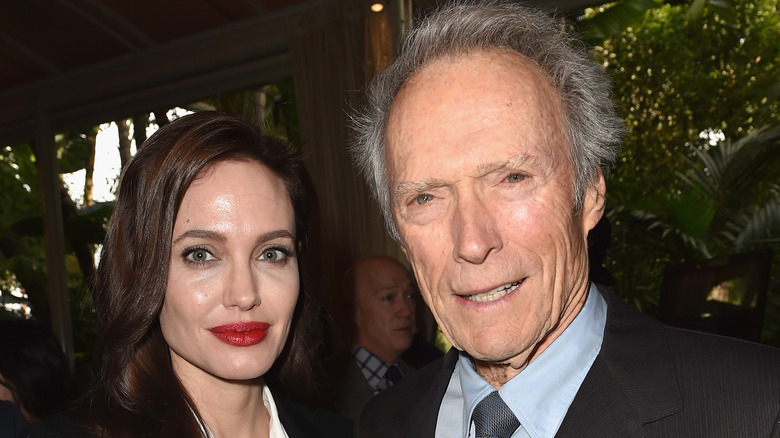The Shady Side Of Clint Eastwood
Clint Eastwood has been in the "icon" stage of his Hollywood stardom for some time. Having celebrated his 93rd birthday in May 2023, Eastwood can boast of success both in front of and behind the camera during a career that has spanned from the 1950s to the present. From his early days as an actor — including his breakthrough role as cowpoke Rowdy Yates on the hit TV western "Rawhide" — to his more recent acclaim as an Oscar-winning film director, Eastwood's work has been both provocative and popular.
As an actor, he's best remembered for two characters: the gunslinging antihero dubbed "the man with no name" in a trio of so-called "spaghetti westerns," and .44 Magnum-toting San Francisco police detective Harry Callahan, a role he played in "Dirty Harry" and several sequels over the course of two decades. Along the way, Eastwood has been nominated for 11 Oscars and won four, with his films "Unforgiven," and "Million Dollar Baby" both taking home Academy Awards for Best Director and Best Picture; he was also presented with another Oscar, the honorary Irving J. Thalberg Memorial Award, in 1995. Meanwhile, Eastwood also entered the world of politics, mounting a successful campaign to become mayor of Carmel-by-the-Sea, ultimately serving for the entirety of his two-year term.
Despite enjoying all that acclaim, Eastwood has also experienced his fair share of controversy over the years. For a closer look, read on to discover the shady side of Clint Eastwood.
He had a baby with his mistress while married to his first wife
Clint Eastwood was just 23 when he first walked down the aisle, marrying Maggie Jones in 1953. When Eastwood subsequently found fame and fortune in Hollywood, reports indicate that he was far from a faithful husband; in fact, Eastwood confessed to a biographer that he was still seeing other women while he and his future wife were dating.
After he'd hit it big on "Rawhide," Eastwood reportedly had numerous affairs with several women. Among these were a flight attendant, a TV reporter who'd interviewed him, and "Rawhide" stunt performer Roxanne Tunis, with the latter becoming a long-term relationship. Tunis — who died in 2023 at the age of 93 — gave birth to their daughter, Kimber Eastwood, in 1964 — while Eastwood was still married to his first wife (that marriage finally ended in 1984, after Eastwood had been in a very public relationship with actor Sondra Locke for several years).
As Eastwood told author Richard Schickel in discussion for his book, "Clint Eastwood: A Biography," he didn't know he'd fathered a child out of wedlock until that child was a year old, when Tunis surprised him by introducing him to his baby daughter. Eastwood compared the shock he experienced to an accident he'd had on a movie set. "I was lying on the ground with the wind knocked out of me," he said. "It's happened frequently in my life — sometimes some physical impact, sometimes mental."
He was challenged to a real-life duel by the husband of a co-star over their affair
By the late 1960s, Clint Eastwood had graduated from television to movies, including the 1969 musical western "Paint Your Wagon," starring alongside Lee Marvin and Jean Seberg. Eastwood and Seberg — both married — had an affair during filming on location in Oregon. Seberg fell so hard that she told her husband, Romain Gary, she was leaving him for Eastwood. Gary was not thrilled to learn of this, and offered a novel response: he challenged his romantic rival to a duel, using unspecified weaponry. "They never went through with it, and instead Romain left, and Jean called her publicist to confess she was madly in love with Clint Eastwood, and she needed help announcing she was getting a divorce," said Karina Longworth in her "You Must Remember This" podcast, as reported by Mercury News.
What Seberg hadn't realized was that Eastwood's feelings for her were hardly as intense as hers for him. She was also unaware that, at the same time that Eastwood was cheating on his wife with her, he was simultaneously having an affair with another woman on the set.
Seberg's assumptions that Eastwood would leave his wife crumbled when he ghosted her after his return to L.A. "Jean couldn't believe that he could be that indifferent to her," said Jerry Tam, Seberg's publicist, as reported by Express. "She was a very vulnerable woman, and it was a terrible trauma for her."
He's fathered eight children by six women
Given his clearcut issues with infidelity, it shouldn't be surprising to learn that Clint Eastwood has been involved with numerous women over the years, and many of these romances resulted in children. In fact, Eastwood is the father of eight, from six different women. These include his first child, daughter Laurie, who was the result of an affair while Eastwood was dating his future first wife; she wound up discovering her lineage when she was an adult, with her and Eastwood ultimately connecting and establishing a relationship.
In addition, Eastwood is father to daughter Kimber Eastwood, from the affair with Roxanne Tunis mentioned above; son Kyle Eastwood and daughter Alison Eastwood, shared with first wife Maggie Johnson; Scott Eastwood (his birth certificate displays the words "Father Declined") and Kathryn Eastwood, whose mother is former flight attendant Jacelyn Reeves; Francesca Eastwood, whom Eastwood welcomed with his "Unforgiven" co-star Frances Fisher; and Morgan Eastwood, the only child to result from Eastwood's second marriage, to TV news anchor Dina Ruiz.
Eastwood addressed his somewhat unorthodox parental situation in an interview with Esquire, crediting then-wife Dina for ensuring that all those kids had become integrated into one big, unconventional family. "I have children by other women. I gotta give Dina the credit for bringing everyone together," Eastwood said. "She's friendly with my first wife, friendly to former girlfriends. She went out of her way to unite everybody."
He openly mocked Sacheen Littlefeather at the Oscars
Clint Eastwood was among the presenters at the 1973 Academy Awards. That particular edition of the annual award show featured an unexpected appearance by Native American activist Sacheen Littlefeather, who accepted Marlon Brando's Oscar — which he'd won in the Best Actor category for his performance in "The Godfather" — at his behest. She told the assembled stars and the worldwide TV viewing audience why Brando hadn't shown up and was refusing to accept his Oscar. "And the reasons for this being are the treatment of American Indians today by the film industry ... and on television in movie reruns, and also with recent happenings at Wounded Knee," she said, referencing the protest by Native American activists that grew into an armed siege lasting 71 days.
Shortly after Littlefeather's appearance, Eastwood appeared on the stage to present the Academy Award for Best Picture, which also went to "The Godfather." Prior to his presentation, Eastwood made an off-the-cuff remark that clearly alluded to and mocked the acceptance by Littlefeather. "I don't know if I should present this award on behalf of all the cowboys shot in all the John Ford Westerns over the years," Eastwood joked.
Eastwood's words resurfaced more than 45 years later when a clip from the broadcast was tweeted by activist Rafael Shimunov in 2019, on the occasion of Indigenous Peoples' Day (It also came amid reports that John Wayne tried to attack Littlefeather over her appearance). That clip reportedly racked up 1.6 million views by the following day.
He feuded with fellow screen cowboy John Wayne
The trio of films that Clint Eastwood made in the 1960s with Italian director Sergio Leone — "A Fistful of Dollars," "For a Few Dollars More," and "The Good, the Bad and the Ugly" — reinvented Hollywood's approach to the Western genre. However, that opinion wasn't shared by John Wayne, who felt that Eastwood's dark, nihilistic character was a personal affront to every cowboy he'd ever played on film, essentially rewriting the history of the American West that his movies had idealized. "Do you know of any country whose folklore has been destroyed?" Wayne griped in a 1972 interview, as reported by The Telegraph.
That came into focus when Eastwood sent Wayne the script for "The Hostiles," in hopes they'd star in the film together. As Eastwood told author Kenneth Turan in his book, "Ride, Boldly Ride: The Evolution of the American Western," Wayne declined. "John Wayne once wrote me a letter saying he didn't like 'High Plains Drifter,'" Eastwood said, sharing Wayne's critique of his directorial debut. "He said it wasn't really about the people who pioneered the West. I realized that there were two different generations, and he wouldn't understand what I was doing."
Eastwood countered by sending Wayne a revised script that hewed closer to the older actor's vision of what a Western should be. Wayne was unimpressed; according to his son, Michael Wayne, Wayne hurled the script into the ocean while declaring, "This piece of s*** again."
His split from longtime love (and onscreen co-star) Sondra Locke was ugly
Clint Eastwood was still married to his first wife Maggie Johnson when he met Sondra Locke, his co-star in the 1976 western "The Outlaw Josey Wales." Locke became Eastwood's on- and offscreen love, starring alongside him in several movies throughout the 1970s and '80s. When Eastwood divorced Maggie in 1984, he and Locke remained a couple until separating in April 1989.
The split was far from amicable. Locke claimed she'd been blindsided by the breakup, which culminated in a letter from Eastwood's attorney insisting she vacate the Los Angeles home they'd shared for nearly a decade. She responded by launching a palimony suit against Eastwood, claiming Eastwood used his clout to kibosh her own directing career. Locke's lawsuit, however, was complicated by the fact that she was also married to someone else, a gay friend with whom she'd only had a platonic relationship.
The case wound through the courts for years but was ultimately settled in 1996 when Eastwood paid Locke an undisclosed sum. "This was never about money. It was about my fighting for my professional rights," Locke told the Los Angeles Times at the time of the settlement announcement. The following year, Eastwood begged to differ. "If you look at [Locke's lawsuits], money was the issue," he told The Independent in 1997. "Somebody can make up stories and put on an act and play the victim ... Some people feel that the world owes them a living."
Clint Eastwood fought back against allegations of violence against women
While Clint Eastwood himself has conceded that fidelity hadn't been his strong suit, some other allegations involving women surfaced that were far more serious than cheating. In his 1999 book "Clint: The Life and Legend," author Patrick McGilligan spoke with Fritz Manes, who alleged that he'd witnessed Eastwood beating his first wife, Maggie.
Manes — who died in 2011 — was no mere acquaintance; he and Eastwood had been friends since childhood, and he'd gone on to work as a producer on 17 of Eastwood's movies. The two reportedly had a falling out during the making of Eastwood's 1986 film "Heartbreak Ridge," which resulted in the men severing both their personal and professional relationships. "Clint just turned round and knocked Maggie out cold," Manes told McGilligan, in an excerpt published in the Irish Independent. "He really decked her, knocked her clear from the living room into the tub in the bathroom."
Eastwood, however, denied that ever occurred, and fired back by launching a $10-million libel suit against McGilligan and the book's publisher, St. Martin's Press. "Clint Eastwood is not only an icon in the entertainment industry, but he is also a family man," Marshall Grossman, Eastwood's lawyer, told Variety when the suit was launched in 2002. "He is entitled to have what is written about him be accurate and truthful." That suit was settled in 2004, with details of the financial agreement remaining confidential.
He punched out son Scott to teach him a lesson
While Clint Eastwood may have balked at allegations he'd beaten his former wife, he did not disagree with a claim that he'd become physically violent with one of his children. That allegation, in fact, came from Eastwood's son, actor Scott Eastwood, who recalled what took place during an interview with the Australian edition of GQ.
According to his recollection, he'd brought his sister Kathryn, then 14, with him to a house party. "I left, maybe to go get beer with the guys," he said, recalling that he'd taken off and left his sister at the party, thinking nothing of it. His father, it turned out, felt it was a much bigger deal; when the "Dirty Harry" star next encountered his son, he slammed the teenager against a wall and then punched him right in the face.
"He popped me and said, 'You don't ever leave your sister at a party. EVER.' And it was very old-school, very old-school of him," he recalled. In fact, the younger Eastwood confirmed that corporal punishment was the rule and not the exception when it came to his dad. "None of this new-age bulls*** where you can't even smack the kid because everyone's afraid of being judged or whatever," he added. "That wasn't the way that s*** went down in that family ... If you did something wrong, you were going to get punished. I [learned] quickly — you don't do that."
His transphobic joke about Caitlyn Jenner at an award show was edited out of the TV broadcast
Clint Eastwood's views on disciplining children aren't the only thing about him that can be described as out of touch with modern sensibilities. During an appearance at the 2015 edition of Spike TV's Guys' Choice Awards, he demonstrated that his opinions about the transgender community are not exactly what one might describe as enlightened.
According to a report from Hollywood Life (via USA Today), Eastwood took to the stage at the event to introduce wrestler-turned-actor Dwayne "The Rock" Johnson. During that intro, Eastwood compared Johnson to other athletes, such as NFL star Jim Brown and "Caitlyn somebody," clearly referring to Caitlyn Jenner, who recently had come out as transgender in a "20/20" interview and, days before the awards, in a high-profile Vanity Fair cover story.
Eastwood's joke reportedly elicited groans from the live audience and did not make it into the final cut of the broadcast. "We will remove the reference in the version that will air," David Schwarz, Spike TV's senior vice president of communications, told USA Today, confirming that Eastwood had indeed said what he'd been reported to have said about the transgender Olympic athlete.
Clint Eastwood doesn't care about political correctness
In his 2008 drama "Gran Torino," Clint Eastwood starred as crotchety retiree Walt Kowalski, an unapologetically racist veteran of the Korean War who nonetheless comes to the defense of his Hmong teenage neighbor, played by Bee Vang. While Eastwood was praised for casting Hmong actors in the film, he was also criticized for his character's racist slurs, intended to demonstrate just how bigoted Walt was.
More than a decade later, Vang wrote an op-ed for NBC News, recalling his uneasiness during screenings when Walt's racist proclamations prompted some audience members to laugh. "I found it unnerving, the laughter that the slurs elicited in theaters with predominantly white audiences," Vang wrote. "And it was always white people who would say, 'Can't you take a joke?'"
During a 2016 interview with Esquire, Eastwood commented on that criticism by decrying political correctness. "That's the kiss-ass generation we're in right now. We're really in a p****y generation. Everybody's walking on eggshells," Eastwood said. "When I grew up, those things weren't called racist." In fact, when he gave a copy of the "Gran Torino" script to an associate, that person expressed concerns that it would be deemed politically incorrect. Eastwood, however, was undeterred. "The next morning, I came in and I threw it on his desk and I said, 'We're starting this immediately,'" Eastwood recalled.
Clint Eastwood told Spike Lee to 'shut his face' after criticism about lack of Black soldiers in WWII film
"Gran Torino" hasn't been the only Clint Eastwood-directed movie to incur allegations of racism. His 2006 war movie, "Letters from Iwo Jima," won critical acclaim — but was also harshly criticized by fellow director Spike Lee. "Clint Eastwood made two films about Iwo Jima that ran for more than four hours total, and there was not one Negro actor on the screen," Lee told reporters during a press conference at the 2008 edition of the Cannes Film Festival, reported by Reuters. Lee continued by claiming that the scarcity of Black faces in that film and its predecessor, "Flags of Our Fathers," had been brought to Eastwood's attention, but he'd refused to address it. "It's not like he didn't know," Lee added.
Eastwood clapped back in an interview with The Guardian, conceding that while there were Black soldiers at Iwo Jima, none of them were among those who raised the flag in the iconic photo on which his films were based. "If I go ahead and put an African-American actor in there, people'd go, 'This guy's lost his mind.' I mean, it's not accurate," Eastwood griped, reserving some choice words for Lee by adding, "A guy like him should shut his face."
Lee responded in kind, telling ABC News of Eastwood's latter remark, "He sounds like an angry old man right there."
He stirred up controversy with a political speech to an empty chair
Anyone who's seen any of Clint Eastwood's films shouldn't be surprised to learn that when it comes to his political views, he tends to lean right. That was on display when he delivered a speech at the 2012 Republican National Convention — which wound up becoming one of his most controversial on-camera moments. That's because Eastwood sarcastically addressed an empty chair sitting next to him as he stood behind a podium, with the chair supposed to represent then-President Barack Obama — of whom Eastwood was not particularly fond.
The 12-minute address, however, left many viewers baffled. In the media, Eastwood's remarks were mocked and criticized, with the New York Times describing the speech as "rambling and off-color," while the Los Angeles Times declared that Eastwood "has apparently lost his mind." In a subsequent interview with The Hollywood Reporter, Eastwood admitted he'd come up with the Obama-in-a-chair gimmick on the spot. "So it was probably at the time I thought this is — this — that was really stupid," he said. "Why did I do that?"
While Eastwood has chosen not to apologize for his speech or the shots he threw at Obama, he did admit that he'd come to regret the whole thing. Asked in an Esquire interview to share what had troubled him in his life the most, he responded, "I guess when I did that silly thing at the Republican convention, talking to the chair."
The circumstances surrounding his 2013 divorce were as scandalous as they were bonkers
Like his first, Clint Eastwood's second marriage ended in divorce, with him and Dina Eastwood (nee Ruiz) officially announcing they'd separated in September 2013. At the time, sources confirmed that they'd actually split the previous year.
Things took a strange turn when, just two days after that announcement, Eastwood was seen squiring around another woman, Erica Tomlinson-Fisher. According to sources at the time, Tomlinson-Fisher had recently gotten divorced from ex Scott Fisher and had contacted Eastwood's office about suspicions she had that her ex-husband was romantically involved with Dina. While those two actually weren't dating at the time, Eastwood developed an attraction to Tomlinson-Fisher, and they began to see each other.
While Eastwood was nurturing his new romance, his ex-wife did begin dating Fisher. That relationship soon turned serious, and the two were married in 2016 — with Eastwood and his ex-wife effectively swapping spouses with his new girlfriend and her ex. Eastwood and Tomlinson reportedly split up not long afterward; since 2015, Eastwood has been involved with Christina Sandera.
He dissed Angelina Jolie — for being too beautiful
Among the many actors to have been directed by Clint Eastwood is Angelina Jolie, who starred in his 2008 drama "Changeling."
While promoting the film, Eastwood attempted to heap some praise on his star, but he wound up paying her a somewhat backhanded compliment by implying that her beauty had overshadowed her skills as an actor. "I've always admired her talent. She's somewhat hampered sometimes by having this gorgeous face, the most gorgeous face on the planet," Eastwood told the Daily Mail. Eastwood continued down that same path when he added, "She's on covers and all that stuff. But she is a great talent, and it would be easy to overlook that, except after seeing this you realize that she is this great, talented person."
Eastwood continued to laud her acting ability, pointing out that actors who sign up to work on one of his movies were well aware of his lightning-fast shooting face, rarely reshooting scenes and quickly moving on to the next — and that Jolie was among those who showed up ready for the challenge. "Angelina is a lot like Meryl Streep in that respect," he said.

